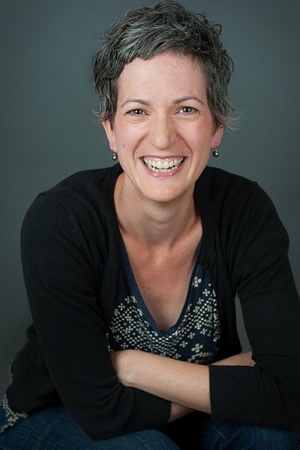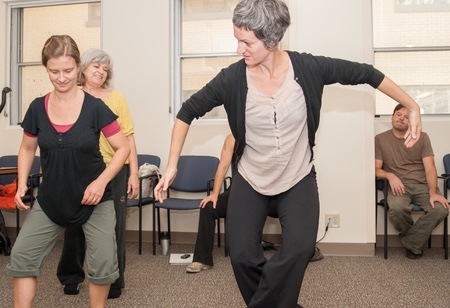4 Questions: Julia Gray
This article is part of our series 50 Years of Disruption, in celebration of the Department of Theatre’s 50th Anniversary. In it, we’ll ask each participant four questions about themselves and their time at York.
1. Who are you?

My name is Julia Gray (BFA Theatre Studies 1998; MA Theatre Studies 2007). I’m currently a postdoctoral fellow at BloorviewResearch Institute which is embedded in Holland BloorviewKids Rehab Hospital (and fully affiliated with University of Toronto’s Faculty of Medicine). I write, direct and produce applied theatre/performance projects, including my most recent play Cracked: new light on dementia which was a collaborative project among artists, health researchers, people living with dementia and their family members (www.crackedondementia.ca). I’ve been working in social justice-oriented arts practices for most of my career, but I have also worked in more traditional theatres such as Young People’s Theatre, Mirvish Productions, Canadian Stage Company, The Charlottetown Festival, Tarragon Theatre, Theatre PasseMuraille, among others. My turn to research came out of the work I’ve been doing since 2005 in health care and disability studies – after having worked in this area for a while, I decided to take the plunge and pursue a PhD at OISE/UT. I’ve published in academic journals across disciplines beyond theatre and performance studies, including education, social science, nursing, neuropsychology, recreation and leisure studies, and public health. I recently edited ‘ReView: an anthology of plays committed to social justice’ (Sense Publishers). In my current position at Holland Bloorview I’m drawing my artistic work as a playwright, theatre director and physical theatre creator together with health and disability research. My work continues to focus on performances that open up questions about cultural assumptions of disability/ability, and also about the ways kids with disabilities make art and performances in hospitals (and the interrelationship between those two things). I’m currently working on a project about therapeutic clowns, and it is SO MUCH FUN!
2. What was your favourite moment during your time in the Theatre Department, and why?
In my undergrad, I co-ran the student-run festival playGround (does that still exist? [YES! it does!—ed.] ), which featured the work of student playwrights and directors (York had an undergrad directing program then!). It was really fantastic to be able to take the lead organzing that event as a theatre studies major, together with production students. To be able to execute something like that, and provide a space for other artists to experiment, was incredibly confidence-building and solidified for me the importance of having those workshop spaces for artistic experimentation.
3. What comment, quotation, statement, or action that a professor—or classmate—offered had the greatest impact on you?
Hm. That’s a tough one. There are many. Here are a couple… First, I remember in my undergrad that several teachers were thoroughly confused, and asked me outright, why I turned down a spot in the acting conservatory, and instead chose theatre studies (I took a spot in the undergrad directing class, and then a year later was also accepted into playwriting). I was confused that they were so confused! At the time, I reflected a lot about what I wanted out of my education, and decided theatre studies offered me the opportunity to take specialized studio-based courses AS WELL AS the entire offerings of the university, including anthropology, women’s studies, history, cultural studies, visual arts, dance (etc). For me Theatre Studies was the right fit, and going into acting would have felt like I was missing something as, at the time, the conservatory training limited what courses you could take to, well, mostly acting. And to that end, I took a choreography course when I was in my final year of my undergrad – and was able to think and pay attention spacially in a different way. I still draw on that work to this day!

As another thought, I remember Paul Lampert saying to me (who was an MFA directing student at the time) that you can’t disrupt things until you know more about what those structures/ideas are. He was referring to Shakespeare, but that idea has infiltrated most of my work.
4. Is there a way you incorporate a particular aspect of your theatre training in your current work?
Oh yes. All the time. The principles of the theatre department at the time, that you needed to have some basic training in a range of areas within theatre in order to be good at whatever your chosen ‘thing’ was (hence, the broad approach to first year), has remained foundational to all my work. If I need to speak to and collaborate with scientists, then I need to know something about science. I don’t have to be a science expert (or a lighting technician, or a stage manager, or…), but knowing something about that helps in how we work together and helps me be better at my job. It led to my MA in Theatre Studies, with Gail Mitchell from the School of Nursing as my supervisor, and also to my PhD and current work at Holland Bloorview.
Also, the work I did with Judith Rudakoff and the playwriting/dramaturgy class continues to inform my thinking and work – the balance between self-reflection/expression and dramaturgical structures/exploration/principles continue to have impact on what I do as an artist and researcher.
